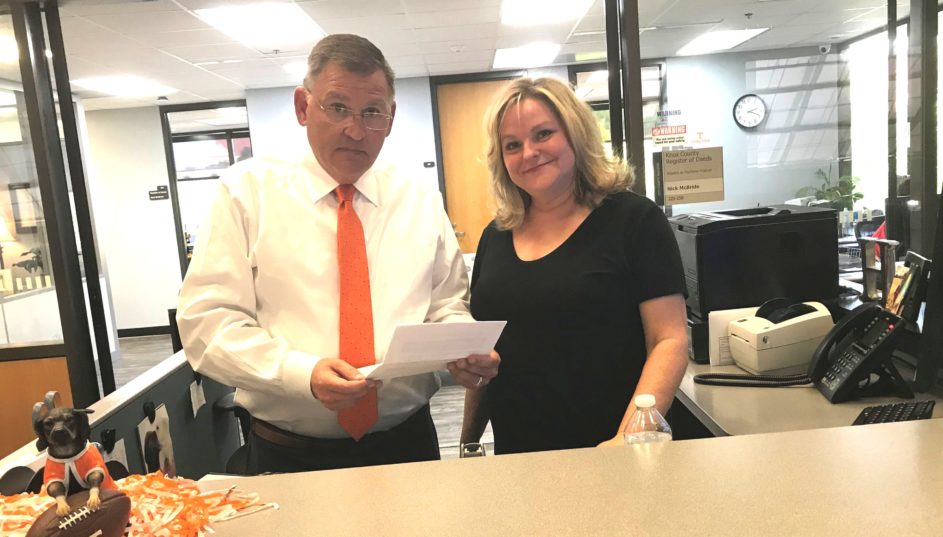If Elizabeth Barrett Browning had dedicated a sonnet to Nick McBride, the first line would have been, “How do I employ thee? Let me count the ways.”
Knox County’s register of deeds is coming up on his first anniversary in the job, but over 28 years he has logged thousands of hours in the register’s office. He worked his way up the ladder to become Sherry Witt’s deputy before gaining the top job in the 2018 election.
But back to Ms. Browning and her counting ways: McBride has made pizzas (remember ShowBiz Pizza?); driven limousines; sold real estate; changed oil and pumped gas in a service station; and mowed and trimmed lawns. He hauled his lawn servicing equipment with a pickup truck at the tender age of 14.
At 18 he was driving a tow truck. One iced-in evening he lost his footing on a slippery street, broke his ankle, and earned some screws to put the injured bones back together. Even Ms. Browning would have agreed there had to be less hazardous ways to earn a buck.
That path beckoned during McBride’s junior and senior years at Farragut High School. Linda Bond, a Farragut High teacher, introduced him to the Knox County intern program.
“Every elected official was involved, and only 60 students from all over the county were selected to participate. I was assigned to the property assessor’s office and trailed after Broadus Hubbs,” he recalled. Hubbs worked in the office for Parkey Strader, the longtime assessor.
After graduating in 1988, McBride gave Middle Tennessee State University a try, but soon decided he wasn’t yet ready for college. (He has since earned two associate’s degrees from Roane State and a bachelor’s degree from Tusculum.)
He obtained his real estate license and worked for a time with his father at Realty Executives in Knoxville. In 1991, recalling then-register of deeds Steve Hall’s words, “If you ever need a job, let me know,” he began his full-time career in the register’s office.
In 2007, the newly-enacted term limits ordinance booted Hall from office, and county commission appointed Sherry Witt to the job. Witt tapped McBride as her deputy.
But long before the mass office reshuffling resulting from term limits, enormous changes were afoot in the register’s office thanks to technology.
“Pre-1991, everything was manual,” McBride said.
Data could be entered through “dumb” terminals, but document preparation and “indexing” was still done manually. The cost for each document was about 30 cents; today, it’s less than a penny.
In June 1991, Steve Hall and Dwight Kessel contracted with Perceptics to build a better mousetrap. One of the innovations that eventually came along was the “optical jukebox.” Like a jukebox, a request for a specific record prompted the device to select an optical data disc to retrieve the information. (Think of it as a DVD player on steroids.)

Tonya Grant and Nick McBride examine a document. “Paper trail” may one day become a quaint expression.
But even this was not fast enough.
“We started scanning documents,” McBride said, and on June 1, 1999, the office “went paperless.”
To get an idea of what that means, consider that there are some 10,000 “books” (bound documents) in the office. The books are a history unto themselves, with entries dating to the time before Tennessee became a state.
McBride produced an “Instrument Activity Report” showing 8,278,070 pages with 1,842,481 recordings of everything from bonds to liens to warranties. The “instrument range” began on July 9, 1985, and ended on Aug. 21, 2019. The data encompassed would require 1,535 books, each costing $410 to compile and bind.
That’s about $629,000 that won’t be spent thanks to automating so much of the laborious manual routine that was once the norm. And, as McBride pointed out, that figure doesn’t include the cost of dozens of file cabinets needed to store the books. The office still produces microfiche, and these sensitive records are stored by the Iron Mountain Company in an abandoned salt mine in Boyers, Pennsylvania.
Since enactment of the law on July 1, Tennessee authorizes “Video Notarization,” a process that completely rids Realtors and title companies of paper. It almost must be seen to be believed, but that’s part of another story for another day, and there are many such innovative stories in this town leader’s office.
Contact Larry Van Guilder at lvg@knoxtntoday.com.

